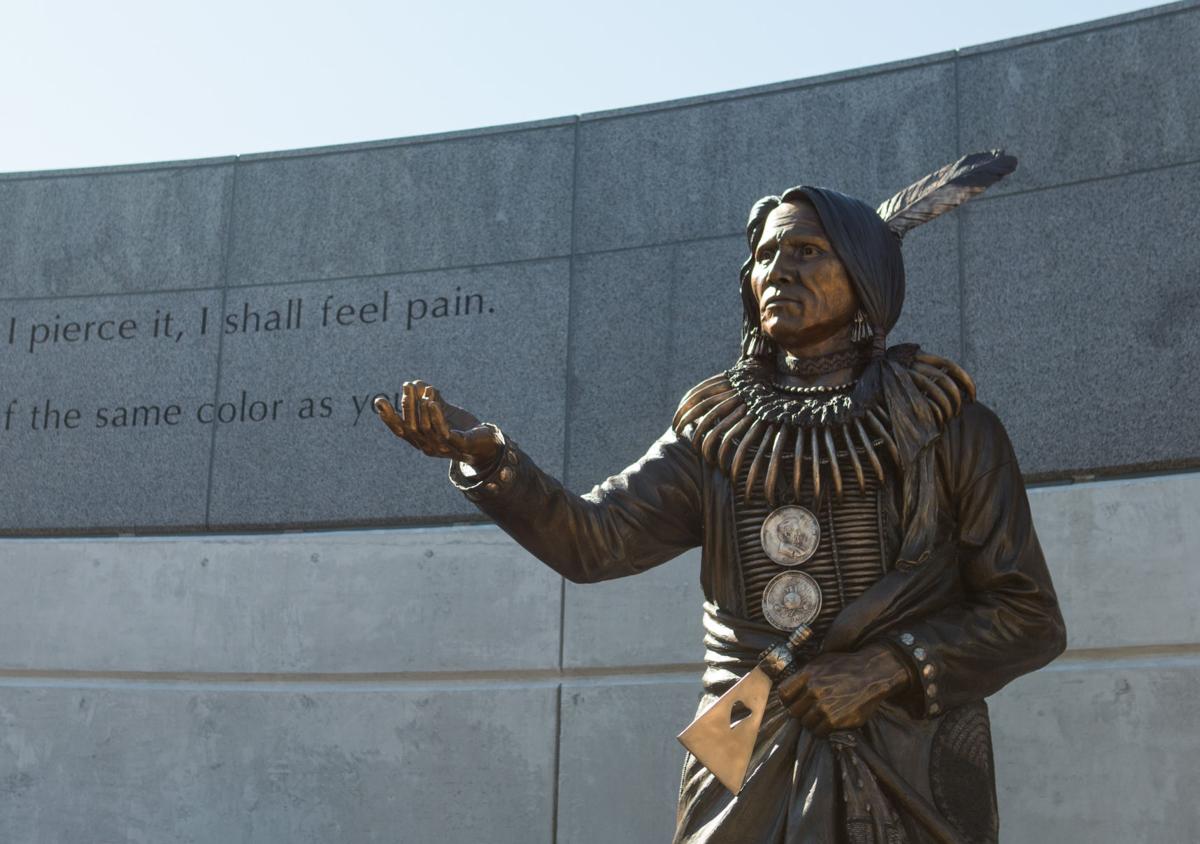
That Standing Bear wanted to honor his son's wishes goes without saying, but he was himself committed to returning Bear Shield's remains to the Ponca homeland for another reason, a reason that can only be described as spiritual. Standing Bear was not of the opinion that death meant the end of life. Native faith held that the dead moved into a spirit world which in many ways resembled the ones they'd left.
Bear Shield wanted his remains to be home as much or more than his father. He wanted to be among the old ones, the ancestors. He wanted to be with his grandparents. That's what he asked on his death bed, and that's where Standing Bear wanted his son as well.
So, once more, Standing Bear and some of his people started out from Oklahoma, 30 of them in all, in three covered wagons. It was the new year, January 2, 1879, and the temperature that day was 19 below. Standing Bear cut a new path north, one farther west to try to escape being followed. They were on their way back to those gorgeous sandstone cliffs of the Missouri River, on their way to the Niobrara once again in weather that was unforgivably cold.
When they left, they violated the law. They'd left without a pass.
They were not warriors, and their band, never much for fighting anyway, were hardly formidable. Along the way, many white settlers, even in their newspapers, criticized Washington for what they were doing to the Ponca. Many fed them as they traveled those 600 miles back home.
Weary and exhausted, they stopped on the Omaha reservation, where their Omaha friends helped them and gave them a parcel of land to farm come spring. They were just a few days travel away from their homeland--from Walthill to Niobrara.
But the government feared precedent. If the Ponca could up-and-leave Indian Country, what would prevent the Osage, the Iowa, the Kickapoo, the Pottawatomie, the Arapaho, even the Cherokee, Chickasaw, and Choctaw from going home too? What would be left to prevent the whole plan from falling into chaos? Some three dozen Ponca, barely alive, had to return.
A newspaper man, Thomas Henry Tibbles, an abolitionist from the old days of Bloody Kansas, heard the story and wrote a fiery piece in the Omaha Herald of April 1, "Criminal Cruelty, The History of the Ponca Prisoners Now at the Barracks.” Among his readers was General George Crook, Commander of the Army of the Platte and generally regarded as the greatest Indian fighter of them all.
Crook didn't need Tibbles' article to know the story. Standing Bear and his weary people were already a presence, under house arrest at Fort Omaha; and Crook had spoken to him and a half dozen of his people just the day before (in white man's clothing, by the way), and in the presence of editor Tibbles. The cavalry had taken the Ponca from the Omaha reservation, not easily either, and brought them to the fort. Standing Bear and his people were, at the time, Crook's responsibility.
Standing Bear implored the general to allow his people to return north to the Niobrara. He told the general he could not read or write but wanted his children to go to school. What's more, the Ponca had farmed long before the white man arrived. Farming was what Washington wanted all the plains Indians to do. Standing Bear said his spirit was exhausted, and neither he nor his band would return again to "Warm Country."
General Crook had told them--March 31, 1879--that there was nothing he could do. He was powerless because the Great Father had ruled the way he had. What General Crook told them he could provide was good food for their recovery, some peace and ease before they'd have to go south once more to Indian Territory. Then he turned to the interpreter. "“I know it’s very hard and painful for them to go down and it’s just as hard and painful for us to have to send them there.”
Tomorrow--the trial.
Standing Bear implored the general to allow his people to return north to the Niobrara. He told the general he could not read or write but wanted his children to go to school. What's more, the Ponca had farmed long before the white man arrived. Farming was what Washington wanted all the plains Indians to do. Standing Bear said his spirit was exhausted, and neither he nor his band would return again to "Warm Country."
General Crook had told them--March 31, 1879--that there was nothing he could do. He was powerless because the Great Father had ruled the way he had. What General Crook told them he could provide was good food for their recovery, some peace and ease before they'd have to go south once more to Indian Territory. Then he turned to the interpreter. "“I know it’s very hard and painful for them to go down and it’s just as hard and painful for us to have to send them there.”
And it was. Crook was not heartless.
The meeting had lasted three hours. When it was over, Standing Bear and his chiefs shook hands with General Crook. Tibbles went home and wrote his story.
The meeting had lasted three hours. When it was over, Standing Bear and his chiefs shook hands with General Crook. Tibbles went home and wrote his story.
_______________
Tomorrow--the trial.
No comments:
Post a Comment